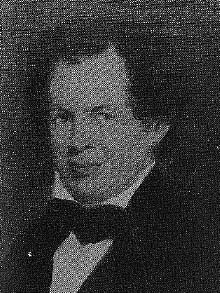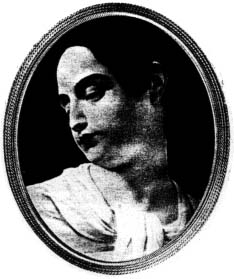|
|



Thomas Willis White & Virginia Clemm
The Messenger and Marriage to Virginia
Clemm
November 1834 - January 1837
Thomas Willis White, Richmond printer, began in the
printing business at age eleven. In August 1834 he launched
a new magazine, The Southern Literary Messenger. The
magazine was, so to say, politically correct - made to be
"a source of innocent amusement". Some would
describe the magazine as boring but it was well received
and after about ten months White claimed that he had nearly
1000 subscribers.
Despite the success he found himself hard-run for
money and needed the help of a trained editor. Early in
1835 White began hearing from Edgar A. Poe in Baltimore.
Edgar gave White many advice but at the same time he stated
that "I have no intention of giving you advice". That was a
good move since White was very eager on staying in control.
Edgar's advice was welcomed and after Edgar's advice
on changing the font, the magazine was praised for its
typography.
White began publishing Poe's tales and book reviews
and the money Edgar made on this came very much in handy
since he had trouble supporting himself. He lived in
poverty and starvation but tried to keep his appearances
up. Despite his worn-out clothing he always tried to keep a
respectable surface.
Kennedy advised White to employ Edgar
permanently, which was needed more than ever since Poe had
fallen in love with his cousin Virginia, "my own darling",
as he called her. He wished to marry her despite the fact
that she was only two weeks past the age of thirteen. When
Edgar's grandmother died they also lost a $240 annual
pension that was granted for General David Poe's widow for
life. Now Poe had a chance to support Virginia and Muddy,
as Maria Clemm was familiarly know. In June White wrote to
Edgar offering him a job.
In August Edgar went to Richmond and he was offered
a monthly salary of $60. Two weeks after these good news
Edgar received a shaking letter from Muddy.
She complained
about the poverty in which they lived and said that
Neilson
Poe had offered to take Virginia to live with him, and
perhaps Muddy too. Neilson did this probably not only to
rescue them from poverty but also to prevent the marriage
between Edgar and Virginia.
Edgar was emotionally hurt and afraid to lose his
beloved Virginia. His reply to the letter shows of his
uproaring emotions and of a probable alcoholic blur. He
expressed his strong love for Virginia and "blinded with
tears" he said that he would be extremely hurt if they
decided to leave him. He even claimed that if they would
accept Neilson's offer he would think of killing himself.
Poe was successful in his work with the
Messenger and White took fatherly care of Edgar, his
own son having died at the age of nineteen, three years
earlier. Poe also got acquainted with White's 18-year-old
daughter, an intelligent and graceful blonde with blue eyes
named Eliza. The possibility of losing Virginia might have
caused Edgar to become romantically involved with her.
Poe was unable to take any pleasure of his success
and by early September he turned to drinking. He wrote a
desperate letter with a suicidal tone to Kennedy asking for
help to convince him of the necessity of living. By the
time Kennedy reached Richmond, Edgar had already left.
Whether he quit or was fired is unknown but the editor felt
somewhat relieved and said that he wouldn't be surprised
"to hear that he had been guilty of suicide."
Poe had returned to Baltimore and on September 22 he
and Virginia took out a marriage license and were perhaps
privately married. To marry a first cousin was not unusual
at the time but to marry at such a young age as Virginia
was extremely rare. Edgar's way of calling her "sissy",
"sis", or "my darling little wife" and that he had flirted
with his fourteen-year-old cousin Elisabeth suggest that
Edgar had a preference for child-like women rather than a
mature or simply a young woman.
Whether married or only engaged, Poe hoped to return
to Richmond and wrote White to get his job back.
White desired to have Poe with him, but he was afraid that
Edgar would turn to drinking again. Edgar was offered the
possibility of getting his job back if he would not turn to
the bottle again. If he did go back to drinking,
their relation would end immediately. On Saturday evening,
October 3, Poe returned to Richmond and with him he brought
Muddy and Virginia.
At Christmas time Poe looked on the new year
optimistically. He felt better that he had for years and he
managed to support the three of them, living in a local
boarding house for $9 a week. Muddy felt thankful and said
"myself & daughter know that we have someone to love &
care for us."
Writings in the Southern Literary Messenger
Poe performed all the duties of an editor at the
Messenger. He advised White on articles, edited
copy, checked proof, took care of the typography, and wrote
on his own. His work gave him knowledge about the magazine
business as well as contacts with respected literary
figures.
Among the stories he published in the
Messenger was "Berenice - a tale",
"Morella",
"Lionizing - a tale", and "Hans Phaal - A tale". In creating
"Berenice", "Morella", and similar stories Poe drew on a
widely popular tradition of Gothic fiction. In
"Metzengerstein" Edgar had been influenced by British,
American, and continental writing from nearly half a century
back. He was particularly influenced by the so-called
`German Tales' featured in Blackwood's and other English
magazines of the period. These tales originated among
German romantic writers who gave English Gothicism their
own twists and, disregarding probability, greatly
exaggerated elements of the horrible and the supernatural.
Gothic fiction aimed at creating the presence of
something that suspends and calls into doubt the laws of
the universe. Poe's influences from Gothic literature can
be seen in his use of premature burials, animated portraits,
physical decay, mansions, and castles. Egaeus and many of
his other protagonists also share with the Gothic hero the
isolation, sensibility, the degenerated lineage from an ancient
family and often addiction to alcohol or opium. They often
help in creating an uncertainty about the correct
interpretation of reality.
Poe especially liked the kind of personal narration
called "tale of sensation" where the persons are usually
solitary victims of a life-threatening predicament, about
to be executed, or about to have a fatal accident. This can
be seen particularly in "Loss of Breath" (an
expanded version of his "A Decided Loss").
Poe did not merely imitate the Gothic tales, he also
enriched them by preserving a central action while adding
philosophical speculations and lore that deepened the
impressions of the tales. He also explored the Gothic
tale's technical possibilities and structured his language
rigorously to keep the prose moving and alive.
Poe made no radical changes in the conduct of the
Messenger, except in greatly enlarging the
magazine's critical department. In each issue he devoted
about fifteen double-columned pages to reviews, most of
which he wrote himself. He reviewed not only fiction and
poetry but also explored new areas such as medical works,
Latin grammars, dictionaries, other magazines etc. Poe
built a reputation as a critic of blunt, unshakable
principle and his frankness was welcomed by many, since
they had developed a fear for "the tyranny of majority."
Poe became a critic to be feared and was not afraid of
giving bad criticism to respected authors. One of his
reviews started with:
"The most remarkable feature in this production is the bad
paper on which it is printed"
Poe drew some public attention to himself in
December 1835 by reviewing "Norman Leslie", a much-
heralded novel written by a New York lawyer, Theodore Fay,
which became a best-seller. In the review Edgar called
Fay's style "unworthy of a school-boy" and he completely
ridiculed the novel.
Edgar did not only comment on the literary quality but
also on the grammar, punctuation and syntax. As a proof
reader he was unequaled and his criticism was often
considered extremely picky, but in justification of his
scrutiny it should be said that the grammar and punctuation
in much American writing at the time were astonishingly
corrupt. But on the other hand, Poe often made the same
errors as he criticized others of doing. He
often made mistakes when writing quotes in foreign
languages since he lacked knowledge in them.
While becoming a prominent magazinist himself, Poe
made the Messenger popular and respected. Praised
for the originality of its verse and fiction, the eminence
of its contributors, the neatness of its typography, and the
fearlessness of its reviews, the magazine became an
important regional journal.



|







